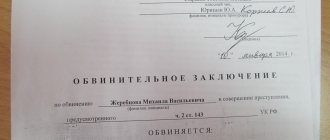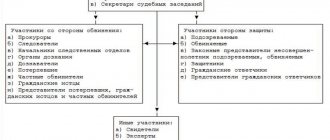1. In the indictment, the investigator indicates: 1) the last names, first names and patronymics of the accused or accused; 2) information about the identity of each of them; 3) the substance of the charge, the place and time of the crime, its methods, motives, goals, consequences and other circumstances relevant to the given criminal case; 4) the wording of the charge, indicating the paragraph, part, article of the Criminal Code of the Russian Federation, providing for liability for this crime; 5) a list of evidence supporting the accusation and a brief summary of its content; 6) a list of evidence referred to by the defense and a summary of its content; 7) circumstances mitigating and aggravating punishment; information about the victim, the nature and extent of the harm caused to him by the crime; 9) information about the civil plaintiff and civil defendant.
2. The indictment must contain references to the volumes and sheets of the criminal case.
3. The indictment is signed by the investigator, indicating the place and date of its preparation.
4. The indictment is accompanied by a list of persons to be summoned to the court hearing from the prosecution and defense, indicating their place of residence and (or) location.
5. The indictment is also accompanied by a certificate of the duration of the investigation, the chosen preventive measures indicating the time of detention and house arrest, material evidence, a civil claim, measures taken to ensure the execution of a fine, to secure a civil claim and possible confiscation of property , procedural costs, and if the accused or victim has dependents - about the measures taken to ensure their rights. The certificate must indicate the relevant pages of the criminal case.
6. After the investigator signs the indictment, the criminal case, with the consent of the head of the investigative body, is immediately sent to the prosecutor. In the cases provided for in Article 18 of this Code, the investigator ensures the translation of the indictment.
Introduction…………………………………………………………………………………..2
1. Indictment
1.1. Concept of indictment …………………………………………………3
1.2. Contents of the indictment …………………………………4
1.3 Actions and decisions of the prosecutor in the case received with an indictment………………………………………………………………………8
2. Indictment
2.1. Concept and content of the indictment …………………………..11
2.2. The decision of the prosecutor in a criminal case received with an indictment …………………………………………………………………………….12
Conclusion…………………………………………………………………………………13
List of references………………………………………………………..14.
Introduction
The preliminary investigation of a criminal case has two independent forms: inquiry and preliminary investigation. Inquiry is the primary form of investigation for cases in which a preliminary investigation is mandatory, and the main form of investigation for simple cases in which a preliminary investigation is not necessary.
Preliminary investigation, as a special type of state activity of specially authorized persons (investigators), proceeding in the form established by law and aimed at fulfilling the tasks of this stage of the criminal process, is the main form of investigation.
At the end of the inquiry, the investigator draws up an indictment. An indictment is an act of preliminary investigation, in which the results of the preliminary investigation are summed up, incriminating conclusions are drawn, which were reached by the investigator on the basis of a comprehensive, complete and extensive study of the circumstances of the case.
The indictment and the indictment, the concept and content, similarities and differences - these are the main issues of this work.
During the work, the following tasks were solved:
-studied the concept of indictment and indictment:
- the contents of the indictment and the indictment were considered, and a comparative analysis of the indictment and the indictment was carried out;
- the results of the studies are summarized and conclusions are drawn.
1. Indictment
1.1. Concept of indictment
The work of the investigator to investigate the circumstances of a criminal case ends with the drawing up of an indictment. This procedural act formulates the essence of a specific criminal case and the accusation, the investigator’s conclusions about the commission of a certain criminal offense by the accused and the need to send the criminal case to court.
An indictment is an act of preliminary investigation, in which the results of the preliminary investigation are summed up, incriminating conclusions are drawn, which were reached by the investigator on the basis of a comprehensive, complete and extensive study of the circumstances of the criminal case[1].
The indictment has important legal significance. It defines the limits of judicial proceedings, both in relation to the persons and the subject of the accusation. This procedural act allows the accused to prepare in a timely manner to participate in the trial.
Its significance lies in the fact that it systematizes all the materials of the preliminary investigation of a criminal case and determines the limits of the trial.
The announcement of the indictment or its operative part at the beginning of the judicial investigation allows the composition of the court, the participants in the process, as well as persons present at the trial, to understand the essence of the charge brought forward, which will be the subject of the trial[2].
1.2. Contents of the indictment
Regardless of the number of accused, only one indictment is drawn up for each criminal case. The indictment must contain the wording of the charges. It provides evidence confirming the occurrence of the crime and the guilt of the person in committing it. This procedural act is served on the accused after the trial has been scheduled. The judicial investigation begins with the announcement of the indictment[3].
The indictment begins with the surname, name and patronymic of the accused, the article of the criminal law under which the crime is qualified. The indictment consists of a descriptive and operative part.
The descriptive part sets out: the essence of the case (the place and time of the crime, its methods, motives, consequences and other significant circumstances); information about the victim; evidence that confirms the existence of a crime and the guilt of the accused; circumstances mitigating and aggravating his responsibility; the arguments put forward by the accused in his defense and the results of testing these arguments. The indictment must contain references to the case sheets.
The essence of the case is a description of the circumstances of the crime committed in accordance with a certain subject of proof in a criminal case[4]. The basis of this description is the charge formulated in the decision to bring the person as an accused.
Information about the victim includes his last name, first name and patronymic, time and place of birth, place of work (service) and other information about his personality that is important for resolving the case. When presenting evidence that confirms the commission of a crime and the guilt of the accused, the investigator cannot limit himself to just listing the sources of relevant information, but is obliged to present the factual data contained in these sources with references to the sheets of the case[5].
The presentation of evidence usually begins with the testimony of the accused. It is indicated whether the accused pleaded guilty and what factual data he provided. By disclosing the content of his testimony, the investigator has no right to violate the rule that the accused is not obliged to prove his innocence.
Then the indictment provides the contents of the testimony of the victim, witnesses, expert opinions, investigative reports and other documents, and indicates material evidence. After presenting the evidence, the circumstances mitigating and aggravating the responsibility of the accused, as well as other circumstances characterizing his personality, are set out.
The operative part of the indictment contains: information about the identity of the accused, the wording of the charge, indicating the article or articles of the criminal law providing for this crime.
Information about the identity of the accused includes: last name, first name, patronymic, time and place of birth, nationality, citizenship, place of work (service), marital status, information about the presence or absence of a criminal record of the accused person, information about his awards, his place of residence , as well as other data relevant to the case.
The formulation of the charge contains a statement of the factual circumstances of the case, after which the legal qualification of the act by the accused is given. It must reflect all the qualifying elements of a crime in accordance with the actual circumstances of the criminal case[6].
If the accused is charged with committing several crimes falling under several articles of the criminal law, the wording of the charge must indicate what specific actions the accused is charged with under each article of the criminal law.
When a crime is committed by several persons, the formulation of the charge is given in relation to each accused.
The indictment is signed by the investigator, indicating the time and place of its preparation.
Attached to the indictment are: a list of persons subject, in the opinion of the investigator, to being summoned to appear in court, as well as information about the duration of the investigation, about the chosen preventive measures indicating the time of detention, about material evidence, about the civil claim, about the measures taken to secure the civil claim and possible confiscation of property, legal costs.
The list of persons to be summoned to the court session shall indicate the surname, name and patronymic of the accused, victim, civil plaintiff, civil defendant, representatives, witnesses, experts, specialists, translators, their place of residence or location with keeping of the case sheets containing their testimony or conclusion.
The certificate on the duration of the investigation must contain the dates of the commission of the crime; initiating a criminal case and accepting it for preliminary investigation; bringing charges; familiarization of the participants in the process with the case materials[7].
The certificate of chosen preventive measures indicates the type of preventive measure chosen and the date of its application. When choosing detention, it is necessary to indicate the exact time of the accused’s stay in the place of pre-trial detention, taking into account the extension of the period of detention.
A certificate of material evidence contains a list of material evidence indicating the places of their storage. This certificate should contain references to the sheets of the case, which contain protocols of investigative actions during which material evidence was discovered and seized.
The certificate of civil claim indicates when, by whom, against whom, and for what amount the civil claim was filed. In this case, precise information is provided about the civil plaintiff and the civil defendant, as well as the amount of material damage subject to compensation.
A certificate of measures taken to secure a civil claim and possible confiscation of property includes an indication of whose property is seized, for what amount, as well as the location of storage of this property. If the seizure was imposed on a large number of items, then the total value of the seized property is indicated.
The certificate of legal costs contains the corresponding amounts determined in accordance with the requirements of the law.
The indictment may be accompanied by certificates not directly provided for by the criminal procedure law: about confiscated orders and medals, about measures taken to care for children and about the protection of the property of the accused, about measures taken to eliminate the causes and conditions that contributed to the commission of the crime, etc. [8]
Attachments to the indictment are signed by the investigator. After signing the indictment, the investigator immediately forwards the case to the prosecutor.
1.3 Actions and decisions of the prosecutor in a case received from
indictment
After receiving a criminal case with an indictment from the investigator, the prosecutor (prosecutor) is obliged to once again check all the materials of the criminal case and answer the following questions:
-whether evidence has been collected in accordance with the procedure established by law to confirm that the criminal act charged to the accused took place;
-whether it contains elements of a crime;
- are there any circumstances leading to the termination of criminal proceedings;
— whether the preliminary investigation was carried out in compliance with the requirements of comprehensiveness, completeness and objectivity;
— whether the accusation is justified by the evidence collected in the case;
-whether charges have been brought for all crimes;
-whether all persons convicted of committing this crime have been brought as defendants;
-whether the criminal act is classified correctly;
-whether the preventive measure was chosen correctly;
- have measures been taken to secure a civil claim and. possible confiscation of property;
- have the causes and conditions that contributed to the commission of the crime been identified, and have the necessary measures been taken to eliminate them?
— whether all requirements of the criminal procedure law were observed during the investigation;
-whether the indictment itself was drawn up correctly (Article 213 of the Code of Criminal Procedure)[9].
The prosecutor or his deputy is obliged, within a period of no more than five days, to consider the received criminal case and make one of the following decisions on it[10]:
1) on approval of the indictment;
2) to return the case to the body of inquiry or preliminary investigation with its written instructions to conduct an additional investigation in this criminal case;
3) on termination of the criminal case;
4) on initiating a criminal case with written instructions to the investigator or investigative body to re-draft the indictment;
5) draw up a new indictment, and remove the previously drawn up one from the case and return it to the investigating authorities or the investigator, indicating the irregularities found in it.
The prosecutor or his deputy also has the right to exclude certain charges from the indictment and apply the law on a less serious crime.
If it is necessary to change the charge in a criminal case to a more serious one or significantly different from the original one, the case is returned to the investigator for filing a new charge.
The prosecutor or his deputy has the right to change the previously chosen preventive measure, or to choose a preventive measure if there was none. In case of cancellation, change or selection of a preventive measure in the form of detention, the rules established by Art. 96 Code of Criminal Procedure of the Russian Federation. The prosecutor or his deputy also has the right to make changes to the list of persons subject to summons to court (Article 216 of the Code of Criminal Procedure of the Russian Federation)[11].
In addition, the list of persons to be summoned to the court hearing attached to the indictment may be changed.
If the case falls within the jurisdiction of a higher court, then, for example, the district prosecutor does not approve the indictment, but sends the case to a higher prosecutor, who checks compliance with the laws during the investigation of this criminal case in the lower prosecutor's office, and if he believes that the case can be sent to court, then approves the indictment and sends it to the court, while simultaneously indicating which prosecutor will support the charge in court.
If the accused does not speak the language in which the preliminary investigation was conducted, the prosecutor must provide a translation, with the help of an interpreter, of the indictment into a language that the accused speaks.
If the indictment is not approved by the prosecutor, the criminal case is returned for additional investigation due to a significant violation of the criminal procedure law.
Having approved the indictment, the prosecutor or deputy sends the case to the court that has jurisdiction over it and notifies the accused about it. At the same time, he informs the court whether he considers it necessary to support the prosecution, after which all petitions and complaints are sent directly to the court (Article 217 of the Code of Criminal Procedure of the Russian Federation)[12].
2. Indictment
2.1. Concept and content of the indictment
At the end of the investigation, the investigator draws up an indictment, which indicates[13]:
1) date and place of its preparation;
2) position, surname, initials of the person who compiled it;
3) information about the person brought to criminal liability;
4) the place and time of the commission of the crime, its methods, motives, goals, consequences and other circumstances relevant to the given criminal case;
5) the wording of the charge indicating the paragraph, part, article of the Criminal Code of the Russian Federation;
6) a list of evidence supporting the accusation and a list of evidence referred to by the defense;
7) circumstances mitigating and aggravating punishment;
information about the victim, the nature and extent of the harm caused;
9) list of persons subject to summons to court.
The accused and his defense attorney must be familiarized with the indictment and the materials of the criminal case, which is noted in the protocol of familiarization with the materials of the criminal case.
The victim or his representative, at his request, may be provided with the indictment and materials of the criminal case for review in the same manner as established by part two of this article for the accused and his defense attorney. The indictment drawn up by the inquiry officer is approved by the head of the inquiry body. The materials of the criminal case, together with the indictment, are sent to the prosecutor.
2.2. The decision of the prosecutor in a criminal case received from
indictment
The prosecutor considers the criminal case received with an indictment, and within 2 days makes one of the following decisions on it[14]:
1) on approval of the indictment and on sending the criminal case to court;
2) on the return of the criminal case for additional inquiry or re-drafting of the indictment if it does not comply with the requirements of Article 225 of the Code of Criminal Procedure of the Russian Federation with its written instructions. In this case, the prosecutor may extend the period of inquiry, but by no more than 10 days to conduct an additional inquiry and by no more than 3 days to re-draft the indictment;
3) on the termination of a criminal case on the grounds provided for in Articles 24 - 28 of the Criminal Procedure Code;
4) on sending a criminal case for preliminary investigation.
When approving the indictment, the prosecutor has the right, by his decision, to exclude from it certain counts of the charge or to reclassify the charge to a less serious one.
A copy of the indictment with attachments is handed over to the accused, his defense attorney and the victim in the manner prescribed by Article 222 of the Criminal Procedure Code.
Conclusion
In the vast majority of cases, consideration of a criminal case in court would be impossible without a preliminary investigation.
Preliminary investigation is the activity of the bodies of inquiry and the investigator to collect, verify and evaluate evidence, on the basis of which circumstances relevant to the case are established, in order to quickly and completely disclose the crime, expose and bring as an accused the person who committed it, and take preventive measures. crime, identifying and eliminating the causes and conditions that contributed to its commission, as well as measures to ensure compensation for damage caused by the crime.
Based on the results of the preliminary investigation, depending on the type of crime being investigated and the body conducting the investigation, an indictment or indictment is drawn up (investigator - charge, investigator - act).
Evidence obtained by the body of inquiry within the limits of the procedural powers granted to it has the same significance for the court as evidence collected by the investigator.
At the same time, there are certain differences between inquiry and investigation: in the range of cases assigned to the jurisdiction of each of them, in the timing of inquiry and investigation, and in some other procedural rules.
In this work, the concept and content of the indictment and the indictment, their similarities and differences were examined, the results of the study on this issue were summarized in a comparative table.
List of used literature
1.
Criminal Procedure Code of the Russian Federation of December 18, 2001 N 174-FZ (as amended on May 29, July 24, 25, October 31, 2002, June 30, July 4, 7, December 8, 2003, April 22 , June 29, 2004)
2.
Alekseeva L.B., etc. Criminal procedural law of the Russian Federation - M. 2004.
3.
Belozerov Yu.N., Efimichev S.P. Indictment in criminal proceedings. M., 2002.
4.
Commentary on the Criminal Procedure Code of the Russian Federation. Under general ed. IN AND. Radchenko. - M., 2005.
5.
Smirnov A.V., Kalinovsky K.B. Criminal process: Textbook for universities / Ed. ed. A. V. Smirnova. St. Petersburg: Peter, 2004. - 697 p. — (Series “Textbook for Universities”). 2nd ed. St. Petersburg: Peter, 2005.
6.
Criminal procedural law of the Russian Federation. Textbook. Rep. ed. P.A. Lupinskaya. - St. Petersburg: Peter, 2005
7.
Criminal process: Textbook / Ed. A.S. Koblikova. – M.: Norma – Infra-M, 2004.
[1] Alekseeva L.B., et al. Criminal procedural law of the Russian Federation - M. 2004.
[2] Smirnov A.V., Kalinovsky K.B. Criminal process: Textbook for universities / Ed. ed. A. V. Smirnova. St. Petersburg: Peter, 2004. - 697 p. — (Series “Textbook for Universities”). 2nd ed. St. Petersburg: Peter, 2005.
[3] Criminal Procedure Code of the Russian Federation of December 18, 2001 N 174-FZ (as amended on May 29, July 24, 25, October 31, 2002, June 30, July 4, 7, December 8, 2003 , April 22, June 29, 2004)
[4] Criminal procedural law of the Russian Federation. Textbook. Rep. ed. P.A. Lupinskaya. - St. Petersburg: Peter, 2005
[5] Criminal Procedure Code of the Russian Federation of December 18, 2001 N 174-FZ (as amended on May 29, July 24, 25, October 31, 2002, June 30, July 4, 7, December 8, 2003 , April 22, June 29, 2004)
[6] Commentary on the Criminal Procedure Code of the Russian Federation. Under general ed. IN AND. Radchenko.- M., 2005
[7] Criminal procedure: Textbook / Ed. A.S. Koblikova. – M.: Norma – Infra-M, 2004
[8] Alekseeva L.B., et al. Criminal procedural law of the Russian Federation - M. 2004.
[9] Alekseeva L.B., et al. Criminal procedural law of the Russian Federation - M. 2004.
[10] Smirnov A.V., Kalinovsky K.B. Criminal procedure: Textbook for universities / Ed. ed. A. V. Smirnova. St. Petersburg: Peter, 2004. - 697 p. — (Series “Textbook for Universities”). 2nd ed. St. Petersburg: Peter, 2005
[11] Criminal Procedure Code of the Russian Federation of December 18, 2001 N 174-FZ (as amended on June 29, 2004)
[12] Criminal Procedure Code of the Russian Federation of December 18, 2001 N 174-FZ (as amended on June 29, 2004)
[13] Belozerov Yu.N., Efimichev S.P. Indictment in criminal proceedings. M., 2002.
[14] Criminal Procedure Code of the Russian Federation of December 18, 2001 N 174-FZ (as amended on June 29, 2004), Art. 226
Tags: Indictment. Indictment Abstract Criminal trial









